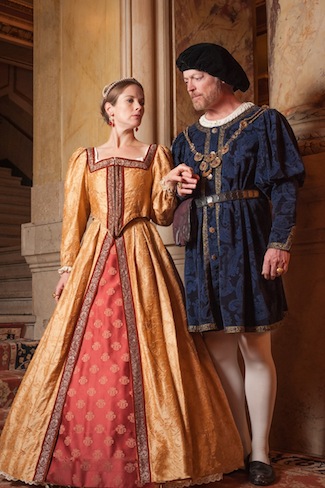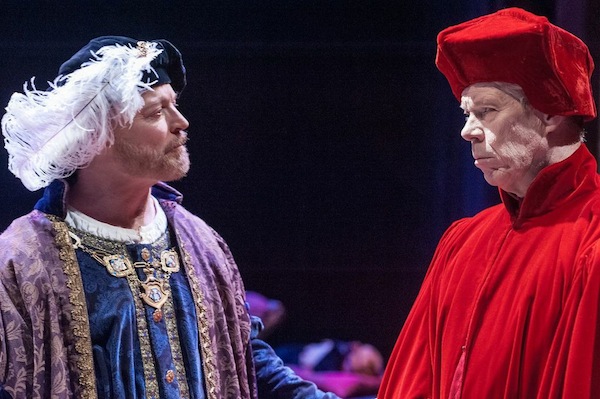Theater Review: Shakespeare’s “Henry VIII” — History as Smoke, Mirrors, and Spectacle
Given how rarely “Henry VIII” is staged, any Shakespeare enthusiast worth his or her salt should definitely take in this uneven production.
Henry VIII by William Shakespeare. Directed by Tina Packer. Staged by the Actors’ Shakespeare Project at the Modern Theater at Suffolk Theatre, Boston, MA, through January 5.
By Bill Marx

Queen Katherine of Aragon (Tamara Hickey) and King Henry VIII (Allyn Burrows) in Actors’ Shakespeare Project’s “Henry VIII.” Photo: Stratton McCrady.
Why did William Shakespeare write Henry VIII? In her program notes, ASP director Tina Packer tries to answer the question, suggesting that the Bard might have penned a history play calling for as much airbrushing as it does pageantry because of the competition posed by the lucrative court masques of Ben Jonson and Inigo Jones. Or was it to celebrate the royal nuptuals of Princess Elizabeth, King James’ daughter, and Prince Frederick, a leader of the Protestant union in Germany, in 1613, the year the play was staged? Given the public rejoicing, the time was ripe for a script that celebrated both the downfall of the last great Catholic statesman in England (Cardinal Wolsey) and the birth of the first Elizabeth (Protestant from birth). Packer eventually trots out her ‘Women of Will’ thesis, suggesting that the Bard “could be paying tribute to the feminine spirit,” though the initial audience for the play would have been aware that Archbishop Thomas Cranmer, who memorably hosannas Elizabeth’s birth, was burnt at the stake by Henry’s daughter, Mary, in 1556. You don’t turn your back on that kind of fire-breathing female spirit.
Complicating the issue is that Henry VIII is the follow-up to one of the greatest plays in the English language, The Tempest, yet many critics believe that Shakespeare was assisted by John Fletcher. That would explain some of the script’s uninspired patches of writing and boilerplate set-up scenes, where characters stroll onto the stage and start updating each other about what they have heard at the court. Still, there are unmistakable touches of Shakespeare’s genius, as when Henry VIII reflects on the leave-taking of an agonized Cranmer: “He has strangled /His language in his tears.” Who else could have written that line?
One wishes that there was more of that kind of brilliance in the play. Only Wolsey receives a soliloquy, so we are never given a glimpse of what is going through Henry VIII’s mind as he methodically ditches his admirable spouse Katherine (supposedly because of his festering guilt that she had been his brother’s wife) in the search for a male heir. The feisty Katherine is handed some marvelous, sad speeches on her wronged innocence. But aside from that, the emphasis in Henry VIII is on the external trappings of woe — there’s not much humor, no complicated plotting, no pesky rebels and wars, only a focus on three deaths amid multiple occasions for blaring trumpets and royal woop-de-doing. It was the cannons fired during a performance of Henry VIII that burnt down the Globe Theater, perhaps a prophetic warning of what an appetite for special effects would do to the integrity of storytelling.
The uneven Actors Shakespeare Company production is necessarily stripped down, so the called-for partying and grandeur is minimized, which in some ways emphasises the threadbare aspects of the script. If Shakespeare gambled that the sound and fury would divert viewers from thinking too hard about the story’s fuzzy depiction of history, then the low-cal approach is a drawback. For me, the lack of royal gewgaws and gamboling is far less of a problem (Tyler Kinney’s costumes are pleasant enough) than having a number of cast members play multiple roles. The supporting players eventually start blending into one another as in an epic movie, no particular performer creating a distinctive impression — semaphore-like gesturing, attitude-striking, and preening take the place of detailed characterizations and modulated verse delivery. The stalwart Bobbie Steinbach — often, though not always, in the guise of a Fool — delivers the Prologue and Epilogue and tackles a variety of vastly contrasting roles. Packer’s directorial gambit is confusing because it (apparently) undercuts all that we see — if everything is a joke, if this dream of history should be taken as an ironic farce, then why feel anything about the deadly lead-up to Elizabeth’s birth?

Allyn Burrows (Henry VIII) and Robert Walsh (Cardinal Wolsey) face off in the ASP production of “Henry VIII.” Photo: Stratton McCrady
That leaves the major performers, and here the play is generally well served. His red robe sweeping across the stage with intimidating vampiric panache, Robert Walsh’s Cardinal Wolsey comes off as a born-again Dracula, his stoic face masking endless conniving. The role is one-dimensional: this is the last of Shakespeare’s standard machiavellian villains, baddies who battle up from the bottom rung (Wolsey was the son of a butcher) only to fall from the pinnacle of power due to adverse circumstance rather than self-betrayal. Walsh does well with character’s acceptance of his reversal of fortune, though I am not sure any actor could make the Wolsey’s heartfelt expiation of his sins (after his hand has been caught by the King in the cookie jar!) emotionally compelling or convincing.
As Katherine, Tamera Hickey is appropriately tough and tender, the actress infusing her character’s death with flickers of mystical reconciliation (Packer accents the heavenly flight of this “feminine spirit” by projecting a giant image of a flapping dove in the background). Henry doesn’t deserve such gentle understanding from his wronged wife. Allyn Burrows, somewhat raspy voiced, makes for a smug, single-minded king, absolute in his loves and hates. Henry VIII is in danger of becoming a supporting player in his own play, but Burrows supplies a charismatic enough presence to fend that off. Craig Mathers is solid enough as Buckingham, though there’s not enough confusion in his portrait. Here is a guy who is beheaded for plotting treason. The evidence is trumped up (through the machinations of Wolsey), yet Buckingham isn’t quite sure if he might have said something to someone that made him guilty. Wolsey is maniacal, Katherine is blameless, and Buckingham, well, he isn’t sure.
Buckingham’s uncertainty pretty well sums up the play for me, though there are those who think Henry VIII is completely celebratory. Given how rarely it is staged, any Shakespeare enthusiast worth his or her salt should definitely take in this production. Just keep in mind that spectators at the time the play was staged were clued into the real story, which not only included Henry VIII killing Anne Boleyn after she miscarried a deformed son, but that he violently eliminated other wives and beheaded Sir Thomas More and Thomas Cromwell. Viewers didn’t need a Fool to tell them that Shakespeare (and Fletcher?) had set up smoke and mirrors in the Globe.
